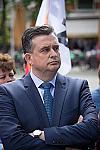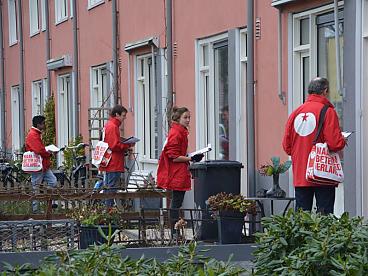'Services haven’t been cut back by victims of war, but by the government’
'Services haven’t been cut back by victims of war, but by the government’
Prevent the creation of streams of refugees and ensure decent reception accommodation, in the region itself and here, says SP leader Emile Roemer. Fifty billion euros in spending cuts by Prime Minister Rutte’s two successive governments have fuelled people’s anger. And, Roemer says, ‘this anger is justified.’
What is the SP’s analysis in the refugee debate?

Even amongst SP voters there are people who want to see ISIS bombed.
Perhaps. But I can’t help thinking straight away of the invasion of Iraq almost fifteen years ago. Then too amongst SP voters who were polled there were many who weren’t opposed to bombing the country. The SP analysis was ‘more war causes more destabilisation’. We are now seeing the results, indeed. ISIS was created by, amongst other things, the West’s thinking that bombing the Middle East would bring democracy. That’s why I was pleased to see the Amnesty International ad a while ago with the message ‘European leaders, you shouldn’t concern yourself with the polls, but with the history books.’
What’s the outlook internationally?
Violence always provokes a counter-reaction. The PvdA (Dutch Labour Party, centre-left element in governing two-party coalition – translator’s note) has turned drastically around. They now support more bombing of Syria. More bombs, more war, more refugees. But also more people who feel the attraction of radical groups who thrive on hatred of the west. For every bomb dropped on Syria, ten new fighters join the terrorist movement, ready to fight in Syria or in Europe. The traditional parties haven’t learnt from the mistakes they made, so they continue to mop the floor while leaving the tap running, and refugees continue to stream out, and the stream even grows.
What were these mistakes?
Fifteen years of a policy of aggressive intervention in the Middle East has not promoted stability in the region. From Afghanistan and parts of Pakistan to Iraq, Syria and Libya. It’s still a mess. Worse still, it’s merely encouraged the radicalisation of certain groups. In Syria countless countries and organisations are waging their own wars. Nobody can think that they’re going to solve the problems in those places with yet more violence. Without a broad political solution you’ll achieve nothing with violence, that’s the lesson of the invasions of Iraq and Afghanistan.

The atmosphere has also been determined by what happened in Cologne on New Year’s Eve.
Certainly. I’ve expressed my disgust at this. You keep your hands off other people and those who don’t should simply be arrested. At the same time we need to keep a cool head. People who misbehave have to be dealt with, but not an entire population group. But Wilders (leader of the far right PVV – translator’s note) wants to put all male refugees under lock and key. Those are dictatorial solutions for a problem with a small group. Should we put the whole of the PVV parliamentary group in jail if one of their members oversteps the mark? The SP will continue to vigorously resist such extreme right-wing ideas.
So that’s why at the Party Council you called Wilders a ‘radicalised VVD-ite?’?
Wilders represented the VVD (the centre-right component of the two-party coalition government – translator’s note) in parliament for many years. He remains a true neoliberal. If you examine his voting record, you’ll see that of all parties the PVV is the one which most often takes the VVD’s side in votes. On all major issues during Rutte’s first governmental period (October 2010-November 2012, translator's note) he voted for its austerity policies. The PVV wanted to see off even more social housing than did the VVD. He voted for the marketisation of health care. He voted for cuts in spending on social workplaces, because of which a lot of people lost their jobs, and for the raising of the pension age. He voted for the lowering of the social minimum (the minimum income depending on one’s circumstances, below which one receives income support – translator's note), helping to boost the gap between rich and poor. All of the proposals which the SP puts forward for a fairer tax system, such as a millionaire tax, or that the very wealthy and multinationals should for once pay more honest taxes, the PVV systematically votes against these. So Wilders sits to the right of the VVD, with a sauce of hatred added. So yes, he’s a radicalised VVD-ite.
Yet he knows how to translate all this anger into good poll results.
That remains to be seen. Wilders laid the blame for all problems first onto the Greeks, then the Muslims and now the refugees. But it wasn’t a Greek who sold off the social rented housing here. And it wasn’t a Muslim who raised the pension age. And it wasn’t a refugee who introduced marketisation in health care. Wilders sets the victims of his own austerity policies against other victims, to keep himself out of the picture. He tries to put hatred of foreigners into people’s minds in reaction to the destructive politics for which he himself is responsible.
There’s been a great deal of scaremongering. European Commissioner Timmermans (a former PvdA minister – translator’s note) published exaggerated figures. What do you think of this?
I hear a lot of nonsense. People are far too ready to pigeonhole others. In my view the SP has to bring people together. Timmermans cited figures which seemed to show that only a minority of the people coming here now are really in flight from war. The UN quickly produced figures that proved the opposite. The Dutch figures also don’t match Timmermans’ account. I think you have to be cautious with this. Timmermans’ figures are – let me also be cautious – dubious. He’s too quick to call on easy things which don’t seem to be correct. That’s very annoying, for many reasons. And it fuels right-wing sentiments.
What do you think of the fact that the PvdA is now going to go along with this?
I say – watch out that you don’t adopt the PVV’s language. “If we want to keep the welfare state on its feet, we have to contain the flow of refugees.” That’s the language of the extreme right. Them against us. I find that a handful of PvdA-ites in the government in the last few years have devastated public services. It’s going from bad to worse. In Denmark the social democrats are supporting the policy of seizing refugees’ possessions. People are saying that if a millionaire arrives in a refugee boat, then they should certainly pay. But such people don’t arrive in a refugee boat. There’s nothing wrong with rich Syrians paying for their keep, but that’s somewhat different to pulling people’s jewellery from around their necks. That doesn’t solve anything, but it does undermine people’s dignity. I’m not saying that that’s what social democrats say. But let people with a left-wing heart consider in future what they are going to do in the polling booth.

SP members and supporters in Bernheze were threatened because they wanted to hold an enquiry on the subject of the refugees outside a supermarket. How does the party deal with this?
I’ve offered the branch every support. I was pleased to go to Bernheze. They know that they have the full support of everyone in the party. At the Party Council (a quarterly meeting of all branch chairs and others which forms, between national congresses, the SP’s highest decision-making body – translator’s note) several members offered to go there right away to help. But it’s a local apparaisal which will ultimately prove the wisest. It is of course volunteers who conduct these surveys. I found the branch’s reactions good: they don’t accept threats or violence. They are going to carry on asking people about this subject. They won’t be driven from the field. They’re simply going to be doing this door to door, and via the website.
Is discussion possible when merely putting questions leads to threats?
But of course! It’s down to us to keep talk to everyone. People have justifiable concerns . If your village of 150 inhabitants, with no consultation, discovers that tomorrow 700 refugees are to be placed there, you too would be up in arms. I heard also from people who were angry that refugees can swim for free when their council has put an end to school swimming. In a council area like that I’d be angry too. If swimming is so important, then make sure it’s available for everyone.
I have noticed that many people are certainly prepared to welcome victims of the war. But they are asking themselves where the political establishment of The Hague was, where were the PvdA, the VVD, the Green Left and the PVV when they had to wait seven years for an apartment? Or when they had to wait six months to see a debt counsellor? You’re first in the queue when it comes to giving a major bank like ABN Amro billions, but my own children can no longer have swimming lessons. Where were you then? That’s what’s making people angry. And on that they’re right to be angry – and I share that anger. It’s our task to address these issues together with these people. Not against the refugees, but against parties which in recent years have destroyed so many social provisions and services.
What do you propose?
First of all, stop thinking that with more bombs and grenades we can stop the stream of refugees, or stabilise the region, or tackle radicalisation. Forget it. It’s precisely the opposite. The same goes for large parts of Africa. Secondly, work on fair trade, so that these countries can build up their economies, based on sustainability and not on exploitation by western multinationals. Until that’s done people there will continue to leave. You create a situation in which extremists can exploit mistrust of the west. Thirdly, it’s good to have reception accommodation in the region, provided conditions are humane. A number of my fellow SP members have been to look at various camps and the situation isn’t humane at all. And if you’ve done that you’re not going to be amazed if people start to think, I’m not staying here till doomsday with my young children in a pool of mud in a tiny tent without medicines, without schools. So we have to provide humanitarian aid there. That’s why we also say: ‘Bread not Bombs for Syria.’
And in the Netherlands?
In the Netherlands people must be given the feeling that their problems are also being taken seriously. The bulk of the people have absolutely no problem with accepting refugees; on the contrary , most people want to help people who’ve been forced to flee. But don’t overwhelm them, go for the small-scale and for integrating people as quickly as possible. And make it clear to the refugees that they now have the right of refuge, but also the right to return when the war is over. Many want to do that too. Syria’s in ruins, they’ll soon be in sore need of people to rebuild. At the same time we must make it clear to the Dutch people that their anger at Rutte’s destructive policies ought not to be aimed at the victims of war.
